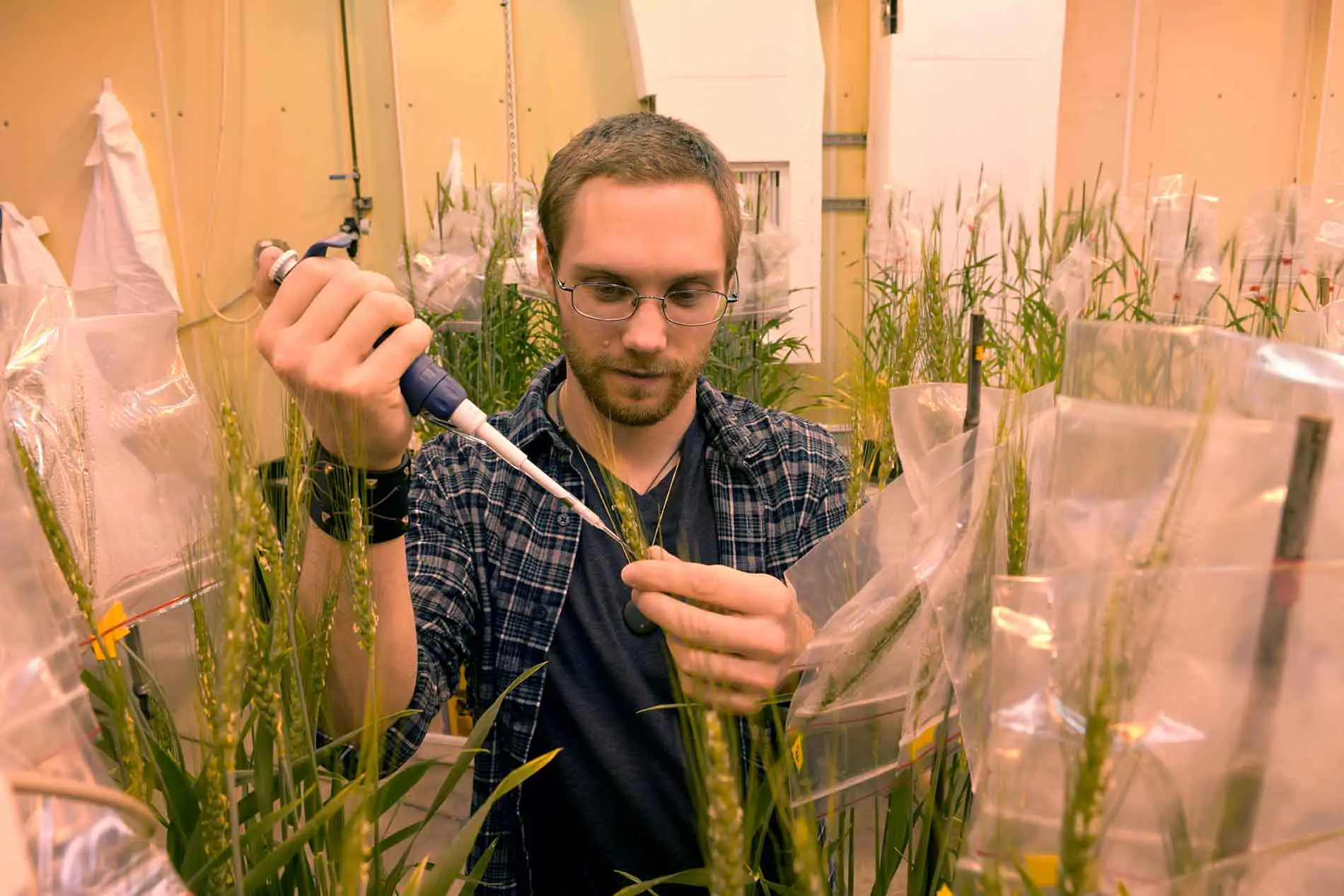USDA ARS Research Participant Shapes a Career in Biological Science
Meet Nathan Kemp
In the summer of 2017, as a participant with the Agricultural Research Service (ARS) Research Participation Program, Nathan Kemp joined a survey crew assessing gypsy moth populations.

Nathan Kemp inoculates wheat as part of a disease progression study at the U.S. Department of Agriculture’s National Center for Agricultural Utilization Research. (Credit: Martha Vaughan, Ph.D.)
“The goal of the survey was to assess population levels of gypsy moths across Illinois in order to make predictions on impacts caused by the pest,” Kemp said.
His experiences as an Oak Ridge Institute for Science and Education (ORISE) participant helped shape and enhance his talents as a researcher and scientist, inspiring him to seek full-time employment within the National Center for Agricultural Utilization Research (NCAUR) in Peoria, IL.
“While with the Gypsy Moth Survey Crew for the U.S. Department of Agriculture (USDA), I was greatly inspired by the people I worked with and their mission,” Kemp explained. “I began to look for new opportunities and purposefully sought positions within the USDA so that I could be a part of that team again.”
The USDA ARS Research Participation Program provides opportunities for students, postgraduates, established scientists and faculty to participate in programs, projects and activities at ARS-designated facilities to help ARS solve agricultural problems of high national priority. The program pairs young individuals who are focused on science, technology, engineering and math (STEM) with ARS research scientists and allows these individuals to gain experience in all aspects of the scientific research process in one of the ARS laboratory settings.
After earning a BA in biology and environmental studies from Knox College, Kemp began a 17-month internship. He assisted two researchers, Matthew Bakker, Ph.D., research microbiologist, and his mentor Martha Vaughan, Ph.D., research plant molecular biologist. The purpose of their research was to improve global food security by contributing to the knowledge surrounding plant pathogenic diseases.
Their research focused almost exclusively on different varieties of wheat and the agricultural and economic impact of a plant pathogenic disease called Fusarium Head Blight (FHB). FHB is caused by the fungal plant pathogen Fusarium graminearum. The United States Wheat and Barley Scab Initiative (USWBSI) funded the research.
Kemp’s research activities as an intern included data collection and analysis. He contributed to experimental design and expanded his knowledge on a variety of new culturing methods, research assays and use of specialized equipment. Kemp drafted a manuscript for the research he completed during his ORISE appointment, titled “Sarocladium zeae is a systemic endophyte of wheat and conveys resistance toward Fusarium head blight.” Kemp is first author on this publication which is being submitted to the journal of Biological Control. Additionally, Kemp’s research contributions led to the funding of another two-year grant proposal for $120,000 from the USWBSI.
“My time as an ORISE research program participant gave me the experience and opportunity to look for permanent employment within the USDA,” Kemp said. “After participating in the program at NCAUR, I accepted a full-time position as a federal employee at the same institution. I work at NCAUR as a biological science technician for Kerry O’Donnell, Ph.D., helping to carry out phylogenetics research aimed at understanding the diversity, evolution and toxin potential of mycotoxigenic and plant-pathogenic fungi.”
Having completed his internship with the USDA ARS, Kemp shared some advice for future participants: “The opportunities presented in such an internship are as much as you make of them, so take full advantage of your surroundings. The experience and knowledge base of the people you will meet are extraordinary, so ask questions and share your interests and ideas. Learn about the facility and its capabilities, then explore what experiences you might gain while carrying out your ORISE appointment.”
The USDA ARS Research Participation Program is funded by USDA and is administered through the U.S. Department of Energy’s (DOE) Oak Ridge Institute for Science and Education (ORISE). ORISE is managed for DOE by ORAU.

